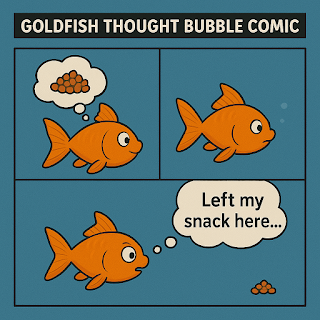Goldfish Memory: Fact or Fiction?
Welcome back to Myth Busting Monday on The Vet Vortex, where we swirl through popular pet beliefs and flush out the falsehoods. Today, we’re diving into a fishy myth that’s been swimming around for way too long:
"Goldfish only have a 3-second memory"
Sounds familiar, right? It’s the kind of "fact" that gets passed around at dinner tables and aquarium shops like it's printed on the side of a fish food can. But is there any truth to it? Let’s bust this one wide open!
The Origin of the Myth
The idea that goldfish have a three-second memory likely emerged from their somewhat...well, blasé appearance. They glide, pause, stare into space like they just remembered they left the stove on, and then float away like nothing happened.
Cue the human assumption: "This fish has the attention span of a soggy cornflake."
But assumptions are dangerous, especially when they underestimate just how smart our scaled sidekicks really are.
Goldfish Have Way Better Memory Than You Think
Goldfish (Carassius auratus) may not be writing Shakespearean sonnets, but they’re far from memory-challenged.
Here's What Science Says:
- In a 1994 study, researchers trained goldfish to press a lever for food at certain times of day. The fish remembered this daily routine, proving they can retain information for at least days, if not weeks.
- A 2003 study by the School of Psychology at the University of Plymouth showed that goldfish could be trained to associate sound cues with feeding time and remembered the training for months.
So yeah… definitely more than three seconds.
How Smart Are Goldfish, Really?
Goldfish can:
- Recognize their owners (yes, you). - goldfish cognitive abilities
- Navigate mazes (like aquatic escape artists). - video
- Distinguish between different shapes, colors, and sounds.
- Learn tricks, like swimming through hoops and playing mini soccer. (I mean, c’mon. If that’s not talent, what is?)
- They’re social learners, too - fish observe and copy each other’s tricks, so your goldfish might pick up a new behavior just by watching its tank mates - Social learning in fishes
- They’re basically the underwater overachievers of the pet world.
Zoonotic Implications: When Your Brainy Goldfish Trains You… to Be Careful.
Okay, so your goldfish can remember your face and anticipate snack o’clock but there’s a flip side to all that aquatic smarts. Those same tanks that house your memory‑master fish can also harbor tiny troublemakers that leap from fish to human. Here’s what to watch out for:
Fish Tank Granuloma (Mycobacterium marinum)
Story time: Last summer, a friend was elbow‑deep in tank water, scrubbing algae off the glass. A tiny nick on her finger went unnoticed until a few weeks later, when a stubborn red bump appeared. Cue frantic Google searches and a quick vet consult.
- What it is: A slow‑growing mycobacterium that lives in aquarium water and infected fish.
- How you get it: Any break in your skin, think cuts, scrapes, or hangnails. This lets the bacteria slip in during routine tank maintenance.
- What it does: Causes a “fish tank granuloma,” a nodular skin lesion that can spread along lymph channels if untreated.
Aeromonas hydrophila Infections
Real‑life moment: My neighbor, also a goldfish enthusiast, shrugged off a small scratch until it ballooned into a painful, red‑hot patch on his hand. A quick trip to urgent care later, and it turned out his tank water had introduced Aeromonas hydrophila into the wound.
- What it is: An opportunistic bacterium common in fresh water that can infect both fish and people.
- How you get it: Similar entry point; cuts or abrasions exposed to contaminated water.
- What it does: Causes skin ulcers, cellulitis, or even septicemia in severe cases.
Keeping It Safe
Your goldfish might be plotting their next clever trick, but you can outsmart these microbes with a few simple habits:
- Suit up: Wear waterproof gloves when cleaning or rearranging décor.
- Patch up: Cover any cuts with a waterproof bandage before tank duty.
- Wash up: Scrub hands and forearms with soap and warm water immediately after.
- Tank TLC: Keep water parameters stable; clean filters, monitor ammonia, and avoid overcrowding.
Why This Myth Matters
You might think this is all cute and quirky, but here's why this myth deserves a proper debunking:
- Tiny, barren tanks
- Poor water quality
- Infrequent feeding schedules
Goldfish thrive in stimulating environments. Just like your dog, your cat, or your chatty parrot, they need space, structure, and attention.
How to Treat Your Goldfish Like the Genius It Is
Here's how to give your fish the tank life it deserves:
Vet Vortex Verdict
So next time someone repeats the "3-second memory" myth, feel free to give them the ol’ side-eye and say:
"Actually, my goldfish remembers where I keep the snacks AND what time they arrive."
Over to You
Do you have a goldfish story? Ever tried training your finned friend? Let’s hear your tales from the tank. Drop your experiences in the comments or tag us @thevetvortex on Instagram for a chance to be featured on our next Fin-tastic post.
Check out previous post - Your Top Parvovirus Questions Answered



